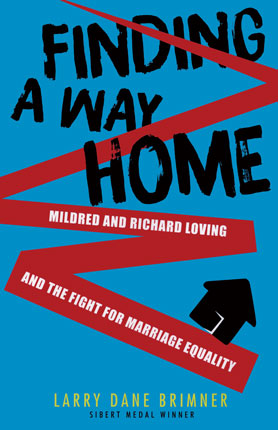| Finding a way home : Mildred and Richard Loving and the fight for marriage equality Author: Brimner, Larry Dane | ||
| Price: $6.50 | ||
Summary:
When Mildred and Richard Loving are arrested, simply because of their mixed-race marriage, they must challenge the courts and the country to secure their civil rights.
| Accelerated Reader Information: Interest Level: MG+ Reading Level: 8.50 Points: 2.0 Quiz: 510903 |
Reviews:
Kirkus Reviews (09/01/20)
School Library Journal (11/01/20)
Booklist (+) (11/01/20)
The Bulletin of the Center for Children's Books (00/11/20)
The Hornbook (00/01/21)
Full Text Reviews:
School Library Journal - 11/01/2020 Gr 7 Up—This effective account of the Loving v. Virginia case examines the legal process behind the 1967 landmark U.S. Supreme Court decision, which ruled that laws banning interracial marriage were unconstitutional. In July of 1958, Mildred and Richard Loving were arrested in their home in the middle of the night for "unlawful cohabitation." Although the couple had married in Washington, DC, the state of Virginia did not recognize their union. When a judge banished the couple from living together in Virginia, they were forced to move to DC, sneaking back to Virginia to visit family and friends. Mildred eventually contacted a lawyer at the American Civil Liberties Union and was connected with Bernard S. Cohen, who took on the case. Cohen hoped to overturn laws that he felt were "relics of slavery." Cohen teamed up with another lawyer, Philip Hirschkop. They took the case to the Supreme Court in 1967, where they argued for equal protection under the 14th Amendment for all citizens, and asserted that the Jim Crow marriage laws were meant to keep non-white people as second-class citizens. Brimner details the legal arguments on both sides. A chapter titled "After Loving" describes the fight for marriage equality and how the gay community often drew on the Loving case when forming their legal strategies. High-quality photographs of primary sources and the featured individuals are included. VERDICT Brimner provides an accessible, succinct introduction to the legal arguments and issues of Loving v. Virginia. Recommended for all middle and high school collections.—Kristy Pasquariello, Westwood P.L., MA - Copyright 2020 Publishers Weekly, Library Journal and/or School Library Journal used with permission.




